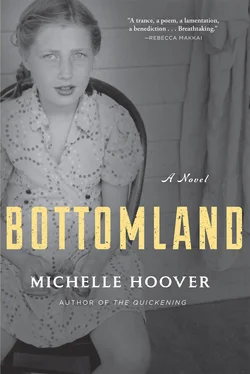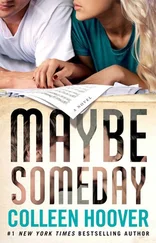That night we lay awake in our beds, listening for the sound of footsteps in the yard. Sleep, it seemed a hollow chore. I thought of how young Myrle had looked in her nightgown. Her feet left their wet prints, as if she’d just stepped from a bath, and she held something in her hand. Myrle never lied. She had never before hidden anything from us. Esther was different. The way she’d stood at the top of the stairs, as if a warning. Then the thudding sound that had woken me again: A door closed? A hammer fallen? The chair wedged beneath the knob? How easy it would have been to pull the nails from the window and pry it open. I could imagine doing so myself. What if I had stepped out of my room a minute sooner? What if I had never gone to sleep at all?
It was months ago that Myrle had taken to her bed. She’d come down with a sickness , or so Esther had called it — so sudden and without reason that we thought to fetch the doctor, but Ray insisted we couldn’t spare the expense. “She’s in one of her fits,” he said. I can’t say I didn’t agree. Myrle, our little bird. Once she almost cut off her hand while grinding feed in the shed. Why, if I had never snapped a finger at her, who knows if she would have reached her fourteenth year.
She asked for the curtains closed, the door locked, a lantern lit in her room all hours of the night. With blankets to her chin, she stared as if death himself stood at the foot of her bed. That girl, so pale her veins seemed to ravage her skin, her white-blond hair unwashed and wet with sweat. She was little more than a gown and bones between the blankets. “You can’t go on like this,” I scolded her. But the loss of a mother can turn a girl inward, no matter the time since. Myrle twisted away.
Later I often found Esther in Myrle’s bed, whispering in her sister’s ear. Myrle’s eyes were open for the first time in days. A rash had spread from her cheeks to her throat, so fevered I yanked the blankets from her. Esther snatched them up again, as if I’d done something shameful — and for a moment I did feel ashamed, gazing at my sister, her nightgown thin over her breasts and stomach, the skin of her neck hot to the touch. Myrle, our beauty, even in her sickly state. Why, when she was born, none of us could keep our eyes off her, carrying her from room to room as if she were a pet.
Mother would have done better. The moment she sensed the door at the top of the stairs was stuck, Mother would have come awake. Why, the house might be empty with every one of us in the fields, and several rooms off Mother could sense a window open just an inch. But I had gone back to bed as if sleep was what needed me most, and now my sisters were missing. Before she died, Mother had taken my hand and craned her neck from her pillow. “What a girl you are, Nan,” she said. “So tall.” Then her gaze settled and her consonants grew long, as if speaking two languages at once. With Father, German sounded a march, but Mother’s throaty vowels were bread and milk and eggs. “You might not have your own, my girl,” she whispered. “But those sisters of yours, they’ll be everything to you. And you’ll be everything to them.”
The town had not seen us together for many months, not after what Governor Harding had done. Why, if German wasn’t to be spoken in public, if even God could not understand a prayer in the German tongue — as our governor had said in his speech — then Germans and their brood might not be welcome in public, not all at once. And when only one of our brothers could serve, we had caused plenty of suspicion. Though we were born in this land and a part of it, still Father and his accent made traitors of us. More than a year had passed since the war’s end, but the town’s sense of wrongdoing remained.
“Well now,” Lee said. The wagon pulled to a stop. He stabbed a finger in his ear. Agnes tied the horses and held close to their collars. Ours was a small town — the main street was three blocks long, with a handful of crossings, all of them dirt. The market squatted under an awning bagged with rain. The town hall stood with its one-eyed clock, the door closed and locked with a bolt. Off the end of the row, the doctor’s house stood quiet, unused most months, a shop of trinkets at the other end. There was a trading post as well, open only on Wednesdays — and only, some said, when the man needed dollars for a bottle. Now even his windows were dark. The town was windswept, the buildings peeling paint. Still, this being a Saturday and harvest, a dozen or more children raced underfoot, men bent to haul their baskets to the market. Their daughters walked the street in their handmade hats, but none of them were my sisters. Not even close.
Ray lifted his boots and landed in the street in a spit of mud. “Ready?”
“I am staying,” Father said.
I turned my head. “You’re staying?”
He crossed his arms over his stomach. “If they see the wagon, they will surely come, and you will be off and I will have found them.” He seemed calmed by this idea. When he took off his hat, his forehead was smooth, only a tight red line from the brim.
Ray held my arm. “Leave him be. It’ll be easier.”
“Easier for who?”
I headed to the market alone. A half dozen customers crowded the aisles, more than I had ever seen at once, though the shelves themselves were spotty with stock. After the war, the newspapers had predicted more of everything — hay and seed, canned vegetables, even meat — but not here. Few in town could pay the price. I stood at the door and wiped my feet. The place smelled of sour milk, and my sisters were nowhere about. Still, a group of women rushed toward me from the counter. I couldn’t back out the door in time.
“Nan,” the first called. It was one of the Clarks, flanked by her younger twins. Their mother swept in and the girls followed, taking their plump little steps. “The hens,” Esther called them, and once at the county fair, my sister had ducked under their bench and pinned their skirts. The next day Mother visited their house to handle the complaint.
“Aren’t they back?” Mrs. Clark asked.
I shook my head.
“But they must be somewhere. I can’t even imagine.”
Her daughters reached for my wrists. “It’ll be all right.”
“They’re probably home,” another said. “You’ll open the door and there they are.”
“So much fuss,” the youngest let out.
“What if they were taken?” The oldest said this under her breath. “The men, they’re so desperate these days.”
“I really must go,” I said. At my shoulder was the flat square of wall where Old Elliot’s sign had been, though different signs hung there now — one begging a price for feed, the other selling acres of land. I imagined the group of them, the Elliots and the Clarks, the Conners, Wilkersons, and others, huddling in Old Elliot’s parlor during the war. Something has got to be done , Elliot had said, and the women glanced at each other, wondering what that something might be. But our neighbors had plenty else to blame us for. Of the farms to the west of town, we owned the better land, the largest house, and the cleanest barn. Why, if we hadn’t given the Clarks half our seed three springs before last, they never would have survived the season. But there was always something to be done about kindness, especially a kindness that reminded a person what little they had.
“Nan,” Mrs. Clark said. “You’ll let us know? If someone did something to your girls, the same could happen to any of us.” In the corner, a woman and her son had turned to listen. An elderly man set down his basket of apples, his head cocked. “Really, I must be going,” I said again. It was no use. In only hours, everyone in town would know the girls were gone, and now this knowing seemed worse than before. What kind of help would it be, if it only kept our names on their tongues?
Читать дальше












